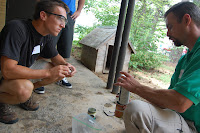Zimmern's show of course is an exercise in sustainable eating and localism, and the title of his show somewhat ironic. After all, the foods that seem bizarre to Americans are simply "food" to other cultures. Of course, there are some truly strange victuals out there. I stopped watching once after Zimmern was offered a glass of sake with a beating frog's heart in it—but in this case he was at a Japanese restaurant famous for concocting weird edibles as tests of resilience and strength, a holdover from Samurai culture.
Mostly Zimmern spends his time eating head cheese, blood sausage, chitterlings, knuckle, tongue, sweetbread, etc—reminding us of a time when it was quite common to eat every last part of an animal in one sausage form or soup other. The show is also a reminder of just how narrow the modern factory farmed and processed American diet has become, to the point at which lamb or liver or hocks are as bizarre as most folks will ever get.
Growing up in England, with parents and grandparents who went through WWII (and in one case WWI), my diet still contained elements of more sustainable times, as well as times of hardship. We sometimes ate inexpensive and nutritious foods such as liver, tongue, haslet, blood puddings, pilchards, and suet—the last two are considered in this country things to feed cats or birds! If we had a beef roast on Sunday, then for evening tea we would eat drippings on toast—the beef fat cooled and congealed to a spread.
I often think of sustainable living in terms of "what era do we need to go back to?" In the case of diet—to use our food resources more frugally and to add more variety and localism—we'd need to travel back to at least 1940, the age before Kraft cheese, margarine, and Jello!
But I wonder if folks have the stomach for this? Well, how about a test?! At Wegmans in Fairmount, NY, you can go to the international foods aisle and purchase a classic British "throwback" food from the turn of the last century: Marmite. It's a sticky, brown, salty spread made from the yeast sludge left over from beer brewing. Deelish! Buy a jar and spread it on toast—if you pass the Marmite test, you'll have the stomach for other "bizarre foods!"
—Martin Walls, Syracuse Center of Excellence





